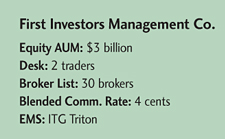If you want to trade with First Investors Management Co., a New York-based mutual fund group with $3 billion in equities, your brokerage firm needs to be as skilled in high-touch trading as it is with low touch.

For head trader Kevin Walsh, today’s complex marketplace–a myriad of exchanges, dark pools and smart-order routers and algorithms–is not a concern. Nearly every order at the firm is high touch: Walsh simply calls his brokers with instructions, making them earn their keep for what amounts to a blended rate of 4 cents per share.
This strategy goes against current thinking in that most money managers look to squeeze their commission spending, which saves investors money since they foot the bill. Interestingly, with last year’s commission downturn, some managers are said to be raising their rates slightly on algorithmic trades, to pay for more brokerage services.
Whether First Investors is ahead of the curve or not, Walsh says its process has been consistent since before he joined in 2007. Call the firm "old school," Walsh says, but he sees advantages to its rate card. Walsh, who spent seven years at First American Bank in Washington, D.C. before moving to BancOne in Columbus, Ohio for six more, says that its clients benefit from the higher rates.
First, for a low-turnover shop like First Investors, the higher rate keeps the firm on brokers’ radar. The firm trades between 25 and 30 percent of its holdings annually. "The Street really likes us, and we get treated well for our size," said Walsh, adding that the two-person desk gets veteran sales coverage and it also sees good allocations for initial public offerings in which it has an interest.
Because its five mutual funds each have a high number of names, First Investors wants to be on great terms with its brokers–those extra eyes help out, particularly if there is news. "We’re a low maintenance account, and we don’t ask for a lot," Walsh said. "But if we do call looking for color in a name, we expect a prompt response and we typically get it."

From 40 to 50 percent of its stocks are mid cap and small cap, so some can be difficult to trade. Although Walsh likes block prints, the liquidity characteristics often don’t permit that. However, he explains that he’s been pleasantly surprised with block liquidity in these hard-to-trade names in broker dark pools.
In January, First Investors was acquired by Foresters, a Canadian life insurance company. Walsh doesn’t see the sale affecting him. But Foresters found First Investors attractive for its U.S. distribution–a sales force of about 800 in 26 states.
Walsh would like to see an investment in an order management system. Given the low turnover, he finds enough time to manually process trades. But time is less plentiful when markets are volatile, given its large number of holdings.
But he’s content with the status quo, as are sales traders who prefer the phone to IM. "The high-touch desks aren’t that active these days," Walsh said, "and want to stay involved with accounts that do steady business. They don’t want to just push buttons all day."




